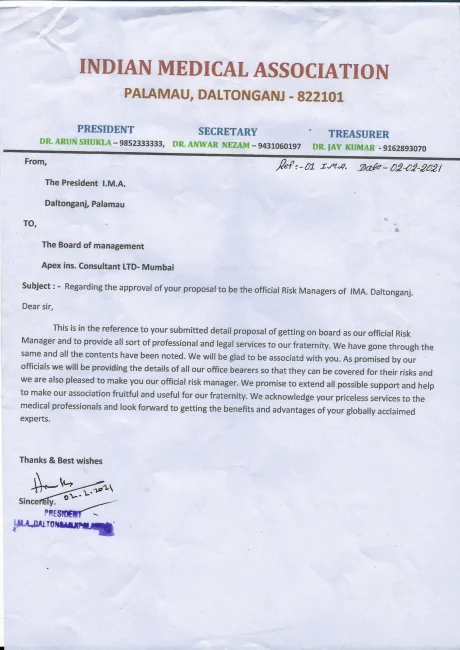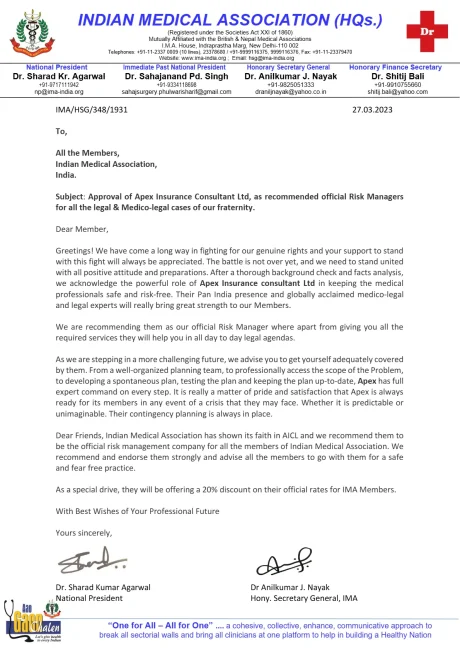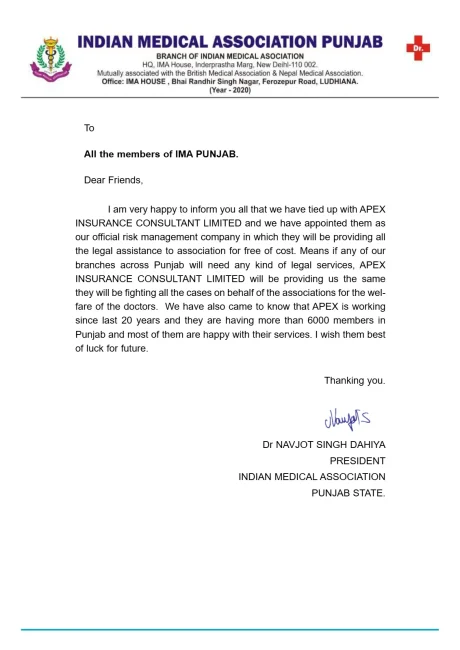Mahesh Baldwa, Varsha Baldwa, Namita Padvi, Sushila Baldwa
Legal implications of writing on IPD paper DAMA
- What is the legal implication of popular term is DAMA means “Discharged against medical advice” which implies that the patient party requested to be discharged and the doctor told him that it was such discharge was not medically advisable looking to the health condition of patient. This means patient party was explained in detail medical unfitness of patient for discharge and usually a written DAMA is taken on IPD paper and proper DAMA discharge card is given to patient party.
- So summarizing DAMA patient status as below
- Given opinion against discharge looking to health reasons of patient
- Patient party signs risks of DAMA discharge on IPD and discharge card
- It is implied all bills are paid or promised to be paid
- Legally patient party will be responsible for any deterioration of health or death of patient after DAMA
Legal implications of writing on IPD paper LAMA
- LAMA means “Left against medical advice’-It would mean that the patient wanted to be discharged from the hospital but was advised against it looking to health status of patient, but still decided to go. In such a situation, it is a common practice in hospitals not to give discharge card. But a detailed discharge card / slip duly handed over to patient party mentioning clinical status, investigations and treatment details will save lot of legal headaches later on. No patient can be forcibly kept in a hospital, even for his own benefit. He must be discharged with discharge slip.
- Not issuing discharge card to LAMA patient is a wrong hospital practice.
- The term LAMA should apply to only those cases who decide to leave in a hurry usually in bad temper giving very short notice, without giving time to the staff to explain the risks involved and to prepare a detailed proper discharge slip. In such cases, it is better to take the following steps:
i. It should be clearly written in the case sheet, under signature of treating doctor, that the patient took a sudden and precipitate decision to leave and did not give time to the doctor and staff to prepare a detailed discharge card / slip and hence the patient was declared LAMA.
ii. even though the patient party left in a hurry with fury and ruckus, the doctors should still prepare a proper discharge card / slip and keep it in the IPD case sheet and give a copy to the patient if he turns up later and wants the same.
iii Treating a patient and not giving, even when requested later, a proper discharge card / slip containing a summary of the hospital stay and diagnosis etc. would be an unethical, unfair trade practice or may be illegal act on the part of the hospital.
Legal implications of writing on IPD paper “ABSCONDED”
- This is a serious event calling for urgent steps
- “Absconded” means that the patient has left the hospital without information and is not traceable within the hospital premises. This is a very serious situation and calls for immediate reporting to the police as well as relatives. The duty of the treating doctor is to inform urgently the hospital administration to report immediately to the police and the relatives. Hospital administration should search hospital premises for missing patient.
- If the police are not immediately informed, following legal problems can occur
- Legally patient is in the custody of the hospital as custodian. If found missing from the custody of the custodian, the latter is liable for all eventualities.
- The relatives may sue the hospital for deficiency of service if the patient is missing from their custody. This means poor safety and security provided by custodian.
- If a sick person in hospital custody is missing from custody and the hospital takes no action and the person is traced later in a serious condition, the hospital would be liable for negligence.
- because it is the duty of the hospital to take all necessary steps to treat disease and to prevent its deterioration.
- If the absconding patient commits suicide, the hospital/doctors can be sued for abetment to suicide. Also the courts may not let them off lightly.
- If the absconding patient commits crime or meets with an accident and dies, there may be insurance claims (life insurance policy claim; health insurance policy claim; accident insurance policy claim); compensation claims (compensation awarded by the Motor Accidents Claims Tribunal, MACT), consumer claims or claims awarded through other legal mechanisms. All these would usually necessitate an FIR and may even have the hospital as a party.
Legal implications of writing DOR/ORD on IPD paper or discharge card? This means “Discharged on request” of relatives/patient or we can say “on request of relatives patient is discharged”
- It would mean that the patient or authorized relatives requested to hospital /doctor to discharge patient from the hospital and treating doctor discharged patient as per request. This is ethically permitted. The hospital/doctor don’t commit any illegality. Actually, for financial and or time constraints often patients are routinely discharged on request and, mostly, such discharges cannot be construed to be “against medical advice”. Hence “at request” or “discharge on request” DOR/ORD do not offer any protection to doctor. Hence though they are not foolproof terms to use. The use of the term DOR may sometimes lead to legal odds if condition of patient deteriorates or the patient dies later.
- Following scenario may develop in DOR, If the condition deteriorates or the patient dies later, the relatives may allege that
- Relatives may allege that they made the request because, as laymen, they were made to believe that the patient’s condition had sufficiently improved. doctor tricked them to request for discharge to get away from possible death in near future, which doctor only knew would happen from the nature of disease patient suffered . Thus allegations of relatives that doctor/ hospital avoided death happening in hospital.
- Patient party never made any request for discharge but the doctor wrote DOR/ORD on his own for ulterior motives and forcibly discharged patient as hospital/doctor wanted to make bed available to someone else.
- Doctor/ hospital asked relatives repeatedly to pay unpaid bills which relatives are unable to pay. at such a moment Doctor/ hospital asked relatives to request discharge as gullible laymen to avoid further mounting up of bill. Implicitly hospital /doctor waives of unpaid bill. Thus Doctor/ hospital get rid of patient not generating any revenue are made to believe one of the three conditions regarding the patient’s health condition that (a) patient sufficiently improved or (b) patient will never improve (c) patient’s death in any case is imminent and is just a matter of time. Thus hospital doctor tries to trick them to request for discharge to save further accumulation of unpaid bills. In such scenario relative might allege unfair trade practice and violation of ethics. Later the patient/relatives are likely to allege that they had paid all dues (even for unpaid bill) in cash and the hospital did not give a receipt.
- Relatives may allege that they made the request because, as laymen, they were made to believe that the patient’s condition will never improve or death is almost lurking around patient and it is just a matter of time and staying in hospital will not make any difference except more spending money for static and / or incurable disease.
How to prevent above odd situations:
hospital / doctor needs to take a written consent of Patient or authorized relative for DOR/ORD and explain that patient is not fit for discharge and should explain the pros and cons of risks and adverse possibilities to patients health condition versus financial savings (in taking home). DOR or “discharge at request” should be actually “informed discharge” instead DOR/ORD. This also helps allegation the doctor acted mechanically and did not apply his mind before). DOR or “discharge at request”. Thus allegation that the doctor failed in his duty or resorted to unfair trade practice will also be addressed.






















































